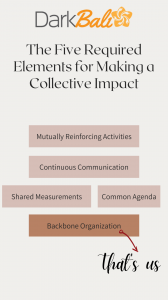Why Coalitions Are Strategic
Large scale social change comes from better cross-sector coordination rather than from the isolated intervention of individual organizations.
A coalition is a community of individuals or organizations uniting together for a single purpose or cause. While each organization within the Dark Bali coalition has their own goals, what we all share in common is the aim to prevent human trafficking in Indonesia and care for its survivors. Currently, there are over eighty active non-profits within the coalition with many other organizations, as well as government, law enforcement, and social services, involved in various capacities. Our desire is to make a collective impact, and we know that we will be stronger together than we could ever be as individual organizations.
According to research, there are 5 essential elements to making a collective impact: a common agenda, shared measurements, mutually reinforcing activities, continuous communication, and a backbone support organization. It is not enough to simply share goals and intentions. Those goals must be organized around activities that meet the agreed-upon, targeted milestones, and there must be some sort of facilitating organization supporting the achievement of these community goals.
From its inception, the purpose of Dark Bali was to be a backbone support organization of the anti-trafficking community within Indonesia. Experts of coalitions note that “the expectation that collaboration can occur without supporting infrastructure is one of the most frequent reasons why it fails.” The newest research on coalitions notes that the structure of each coalition must be developed by members of the community and take into account the cultural realities of that context. This is exactly why Dark Bali’s activities continue to be initiated and driven by the expressed needs of the members of the coalition itself.
At times it can be difficult to quantify the impact of a coalition backbone support organization because our work is behind the scenes. How do we measure the impact of the introduction of two like-minded organizations now collaborating on important projects? How do we measure the impact of translating resources into local languages for community activists so that they do not have to re-invent what already exists? How do we measure the impact of caregivers who avoid burnout because they have been given tools for self-care within a community that understands and cares for them personally? In the end, we must measure our effectiveness based on the major milestones within the anti-trafficking movement. When there are more survivors being served, more traffickers being prosecuted, more vulnerable communities being protected through education, and more visibility for the movement due to increased awareness, we know that our coalition is successful. When our community feels strengthened and equipped to achieve their goals which are all directed toward our common vision because of the support Dark Bali provides, we know that it matters that we are here.






